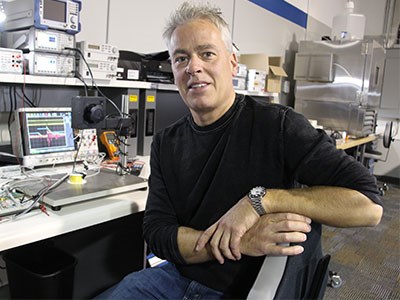Tom Fortin wants people to start making things again.
More specifically, the founder of Ontrak Control Systems, a Sudbury company that manufactures computer control systems, wants engineers and technologists in Sudbury and Northern Ontario to start building electronic and mechanical products.
In the 1960s, most products sold in Canada were also manufactured here, he said. But that time has long gone as cheap labour and capacity from Asia has supplanted local manufacturing.
“It's a matter of national sovereignty that we regain control of our corporations and where things are made,” Fortin said. “In Sudbury, we've lost the sovereignty over the nickel under our own feet because the decisions that are made on what's going to be done with that nickel aren't made here.”
To help change the tide, and regain lost manufacturing jobs, Fortin has teamed up with the Northern Centre for Advanced Technology (NORCAT) to launch the Fortin Discovery Lab.
The state-of-the-art laboratory occupies a large space in NORCAT's Maley Drive office, where it houses around $600,000 worth of advanced manufacturing equipment.
That equipment includes two 3D printers – one of which is a $55,000 industrial-size model. They are used to create plastic prototypes for new product designs.
The lab also includes electronic design and assembly stations, and a machine used for injection molding – which can mass-produce any prototype built in a 3D printer at less cost and greater speed.
Once a prototype is built, the lab has a number of testing stations to measure how a new mechanical object, or piece of electronic equipment, will handle extreme cold – as low as -60 C or heat up to 180 C.
Independent product developers, as Fortin calls them, who work in the lab can test a device's electromagnetic compatibility with a radio frequency chamber.
To receive approval from Industry Canada and other similar organizations internationally, an electronic device must not interfere with other common devices that emit radio frequencies, such as cellphones.
Electromagnetic compatibility tests can also see if a device is susceptible to malfunctioning when it is exposed to radio waves.
While there are a number of similar product development labs in Canada and the United States, Fortin said he was not aware of any that operate under the same organizational structure as the Fortin Discovery Lab.
“This is probably the only one that doesn't have paid employees,” Fortin said.
Instead, the lab's independent product developers – there are five so far – work as independent contractors for companies or organizations that require their knowledge and expertise.
“They're offering design services to other people,” Fortin said.
If a new entrepreneur, for example, does not have the know-how or the facilities required to design a new prototype, they can hire a designer at the lab who will build it for them.
Fortin has travelled to schools around Ontario, including the University of Toronto and Humber College, to recruit young engineers and technologists interested in working in the Fortin Discovery Lab.
“I don't think it's for everybody, but for a lot of people, it's very attractive,” he said. “You're responsible for your own well-being.”
He expects some of his young recruits will go on to develop their own products, and eventually start companies of their own.
The lab, which officially opens Nov. 5, can accommodate up to 12 independent product developers and their teams.
“It is our goal not only to produce advanced commercial products, but to also enhance the competency of young engineers in skills essential to a strong entrepreneurial based manufacturing economy,” said NORCAT's CEO Don Duval, in a press release. “It is all about battling the migration of much of Canada’s manufacturing to Asia, largely as a result of increasing foreign ownership of our corporations.”
For Fortin, the lab is a philanthropic endeavour. The Fortin Foundation, the charitable division of Ontrak Control Systems, received funding from FedNor, and collaborated with NORCAT to make the workspace a reality.
“Canada used to be one of the manufacturing powerhouses of the world,” Fortin said. “It's always bothered me that we've lost the competency to make things.”




